TOM MAPLES spent five days and almost $7,000 getting home to London from Tanzania in May. Many African countries are on the English “red list”, meaning anyone who has visited one in the previous ten days must quarantine in an expensive airport hotel before entering England. Eager to avoid that bill, Mr Maples bought a ticket via New York, where he could crash with friends for a few weeks.
Officials squabbling over paperwork barred him from his first flight. He booked a second but was stopped on his layover in Germany. America’s borders were open to non-Americans travelling from Tanzania, he was told, but not to those coming from Europe. After hours of pleading and searching for alternatives, he resigned himself to flying straight home. But he had another setback: officials demanded he pay the $2,400 quarantine bill before being allowed on board. By then he had maxed out his credit card and had to ask a relative to lend him money. The experience left him “emotionally devastated”, he says.
Governments have succeeded in taking the joy out of travel this summer (see chart 1). Britain has introduced rules of tooth-grinding complexity. In theory its traffic-light system rates countries by covid-19 risk and sets travel rules accordingly. In practice it is arbitrary, unpredictable and constantly changing. Facing pressure from the travel industry and voters keen to venture beyond Britain’s sodden beaches, Boris Johnson, the country’s prime minister, has advocated a “balanced policy”. He did not explain what that meant.

Policies in America are equally baffling. The Biden administration has failed to adapt restrictions in line with vaccination and infection rates overseas. All around the world, a jumble of rules causes confusion, chokes tourism and leaves businesses struggling to work out who can do what and go where.
All of this means travel will remain out of reach for many and messy for all for some time. The chaos is unlikely to subside soon, as new outbreaks emerge and governments struggle to co-ordinate policy. Travellers must scour myriad ministry and airport websites to piece together the rules. Even as the eu begins to reopen, the average member state has 330 restrictions on international travel, according to UBS, a Swiss bank, up from five in March 2020. Timatic, a database of visa and entry regulations compiled by the International Air Transport Association (IATA), a trade body, was updated 200 times in one day last year.
The confusion is made worse by governments taking very different approaches to travel. East Asia and Australasia are largely locked down. The poorest regions, such as sub-Saharan Africa, are largely open. America and Europe are somewhere in between.
The most hermetically sealed countries, which are typically either islands or dictatorships, have kept cases under control by shutting borders and aggressively stamping on outbreaks at home. Australia’s government recently halved its cap on overseas arrivals to 3,000 people a week, even though 38,000 Australian citizens wish to return home. Tough rules can work. In the first week of August, in the midst of its latest surge, the country had just 1,800 new cases. Britain had 100 times that figure. According to a survey by the Australian Broadcasting Corporation, 80% of Australians agree the border should remain closed until the pandemic is “under control globally”.
With only 18% of people fully vaccinated, Australia relies on the bluntest of policy instruments: locking people up to quarantine in government-approved facilities. Pete McGregor, who flew in from London to visit his ailing father in February, felt lucky to be placed in former labourers’ digs outside Darwin rather than an airless hotel. Residents held virtual quiz nights and celebrated a fellow inmate’s birthday. Mr McGregor still describes the trip as “hell”. For such countries, the only way to reopen safely is to vaccinate most people first and then experiment, as Singapore is considering. New Zealand had to scrap that plan this week when a labour shortage prompted the government to say it would reopen borders a bit despite a low vaccination rate.
A second group of governments is asking people to live with the virus. By June only 13% of countries in Europe remained closed to international travellers, compared with 70% in the Asia-Pacific region, according to the un’s World Tourism Organisation. Widespread vaccination makes opening easier. Pent-up demand for travel makes it popular. Back in February searches for international flights by people in France were just 30% of what they had been two years earlier; now they are at 76% of pre-pandemic levels, according to Kayak (see chart 2), an online travel agency. Meanwhile in China flight browsing remains stuck at around a fifth of pre-pandemic levels.

Rich countries that are trying to open up are devising systems to reduce the risks. Last month the eu launched a Digital Covid Certificate, which people can use to prove they have been vaccinated, tested or recently recovered from covid-19. But policies are often inconsistent. America remains closed to visitors from Austria and Germany but not Colombia or Thailand, where vaccination rates are lower and covid-19 infections more widespread. And airline crews struggle with the different forms and passes, often giving a cursory glance and waving people through rather than scanning qr codes. Lufthansa, a German carrier, says staff will be able to scan documents only if test and vaccine certification is standardised globally.
Careful planning and reams of paperwork are distant concerns for globetrotters from a third group of countries: the poorest. Most such places are struggling to get jabs in arms, yet cannot afford to shut their borders. They remain cut off. Because rich countries impose some of the toughest quarantine and testing requirements on poor countries, travel has become unaffordable for an emerging middle class that was just getting a taste for it. Even those who have been jabbed often received vaccines made in India or China, which may not be recognised by rich-world authorities. “It seems like they have found another way to discriminate against us here in Africa,” says Itunu Kuku, a Nigerian living in Senegal.
Overseas trips will continue to be a hassle well beyond the northern summer. If air travel returns to 75% of pre-pandemic levels and airline staff have to continue to cross-check a spaghetti-spill of apps and forms, passengers will spend an average 5.5 hours waiting to be processed at airports, estimates Nick Careen of IATA, up from 1.5 hours before the pandemic.
Get your motor runnin’
International travel could come to feel exclusive, much as it used to in the middle of the 20th century. Those worried about tough checks at airports or catching the virus on a packed flight are already choosing to travel by road or rail. Some will fly again as rules are streamlined and fear of germs fades. But expensive tests and rising airfares mean two-day bachelor parties in Budapest could become less common (to the relief of some) whereas once-in-a-lifetime safaris in Zambia will still appeal to those who can afford one. George Kipouros, editor of Wanderlust, a travel magazine, says it would be a good thing if people began to see travel as something special again, and so appreciated it more.
But for most would-be travellers, a less open world means less freedom. The loss is made more galling by rules that often make no sense. A year and a half into the pandemic, policymakers finally acknowledge what epidemiologists have long known: there is no straight line between curbing travel and curbing infections. Because the virus spreads exponentially, ten imported cases and a hundred lead to a similar-sized outbreak after just a few weeks, notes Adam Kucharski, an epidemiologist. “Anything but very strict travel restrictions will just delay things,” he adds.
Border rules cannot prevent outbreaks unless they are paired with strict domestic rules. People moving within a country spread the virus, too. The highly contagious Delta variant is now spurring fresh outbreaks even in countries that closed their borders. Australia has had to extend local lockdowns and deploy the army to enforce stay-at-home orders. China has launched mass-testing drives and introduced new curbs on domestic travel.
Many of the safety measures that accompany partial reopening are flawed. Asking someone to isolate at home cuts their contact with the outside world by 75%, compared with 90% for hotel quarantines, reports the Lancet. Another study suggests that a costly polymerase-chain-reaction (PCR) test before a flight is worse than a cheaper alternative. It is more accurate than an antigen test, but slower. So travellers have more time to get infected between clinic and boarding gate. A negative antigen test taken on the day of a trip, as many eu states accept, reduces the number of infected people who make it over a border to 24% of levels without any testing compared with 33% for a pcr test taken two days before a flight.
Temperature scanners are also unreliable. During the sars outbreak in 2003, Canada spent millions on them, yet failed to detect a single case. Initial research suggested about half of travellers infected with covid-19 would be caught; recent analysis found the young in particular slip through, as most never develop a fever.
Head out on the highway
At this stage of the pandemic governments’ wishes for a balanced approach to travel are understandable. But evidence of the benefits of many restrictions is murky, whereas the costs are clear. In America only 6% of the workforce were in the travel business in 2020, but they suffered a third of total job losses. Globally, nearly one in five jobs supported by tourism was lost in 2020. Poor countries, especially, rely on it for work. The World Travel and Tourism Council estimates that the size of the international travel and tourism industry halved from 10.4% of global gdp in 2019 to 5.5% in 2020, a $4.5trn loss.
Only when the world is adequately vaccinated will travel start to feel as it did before the pandemic. That may not be until 2024, by some estimates. Even then, daft rules could stick. America’s ban on travellers with hiv was introduced in the 1980s and abolished only in 2010. Likewise, airlines could be asking for covid-19 papers for years to come. Britain’s transport minister, Grant Shapps, says Britons who venture abroad will need to be fully vaccinated against covid-19 “for evermore”.
Vaccine certification may well make sense in the long run. But bans on visitors from certain countries or caps on international arrivals do not. The risk is that these rules and regulations may outlive their purpose not because governments cannot undo them, but because no politician wants to be the first to try.
By The Economist





